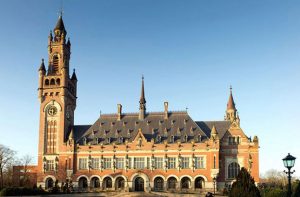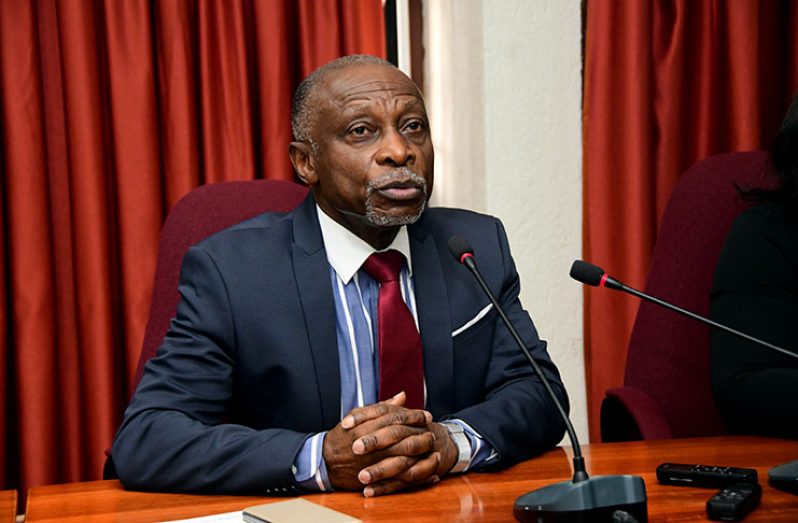THE International Court of Justice (ICJ) has left the doors opened for Venezuela to participate in the oral arguments on whether it has jurisdiction over the case filed by Guyana – Arbitral Award of 1899 (Guyana v Venezuela) but the country’s legal representatives must indicate their participation ahead of the March 2020 hearing.
This is according to Guyana’s Foreign Secretary, Carl Greenidge. Although contending that the ICJ lacks jurisdiction to adjudicate in the matter, Venezuela has failed to submit its Counter-Memorial on Jurisdiction – in response to Guyana’s Memorial on April 18, 2019 – a date which was fixed by the court. Nonetheless, the Spanish speaking country still has an opportunity to contribute to the process.
“Although Venezuela said it will not participate, they (the ICJ) said to Venezuela if you care to change your mind during the course of the deliberations, we will hear you, but Venezuela can’t turn up on the day of the hearing and seek to contribute to the exercise,” Greenidge explained to reporters during a press conference on Wednesday at the Ministry of Foreign Affairs.
In the case of the ‘Counter-Memorial,’ Venezuela has been sending mixed signals on its participation in that aspect of the judicial process. “Venezuelans have indicated that they might be interested but, then again, they might not be making a written presentation; so they try to leave the question open for them to intervene at any time by way of a written contribution,” the Foreign Secretary reported.
However, he took note of the fact that courts are particularly wedded to process, predictability and clarity. The oral hearings will be held in The Hague from March 23 to 27, 2020. The hearing will determine whether the Court has jurisdiction over the case filed by Guyana on March 29, 2018. By that case, Guyana seeks to obtain, from the Court, a final and binding judgement that the 1899 Arbitral Award, which established the location of the land boundary between then-British Guiana and Venezuela, remains valid and binding, and that Guyana’s Essequibo region belongs to Guyana, and not Venezuela.

Guyana filed its case before the ICJ after United Nations (UN) Secretary-General, António Guterres, in January 2018, referred the controversy between Guyana and Venezuela to the World Court. In making his decision, the Secretary-General was exercising the power vested in him in the 1966 Geneva Agreement between Guyana, Venezuela and the United Kingdom to decide how the controversy should be settled, the Foreign Affairs Ministry explained.
In a letter to the Court, Venezuela contended that the Secretary-General exceeded his authority under the Geneva Agreement, and that the Court, therefore, lacks jurisdiction to adjudicate Guyana’s lawsuit. On that basis, Venezuela has indicated that it will not participate in the proceedings.
Regardless of whether Venezuela participate or not, the ICJ will hand down a ruling on the matter. “Under well-established judicial precedent, the Court will proceed to decide if it has jurisdiction over Guyana’s claims, irrespective of whether or not Venezuela participates in the proceedings. If it decides that it has jurisdiction, the Court will proceed to rule on the merits of those claims, and decide whether the validity of the 1899 Arbitral Award and the border between the two States should be confirmed,” the Foreign Affairs Ministry explained.
It noted that under the United Nations Charter and the Court’s own rules, its final judgements, both on jurisdiction and the merits, will be legally binding on Guyana and Venezuela, whether or not Venezuela participates in the proceedings.
Nonetheless, Guyana remains hopeful that Venezuela will participate, to indicate respect for the Court and the international rule of law, the peaceful settlement of disputes, and the promotion of friendly relations between both States. “The Government of Guyana welcomes the prospect of a final and binding decision by the Court that will definitively resolve this long-standing controversy, and allow Guyana and Venezuela to proceed to develop excellent and close relations as neighbouring states,” the ministry stated.
In its submissions, Guyana pointed out that the boundary with Venezuela was established by an arbitral tribunal constituted pursuant to a treaty concluded by Venezuela and Great Britain in 1897. It said the record would show that Venezuela accepted the unanimous award rendered by five eminent jurists on October 3, 1899. The Spanish-speaking country had also participated in a joint commission to demarcate the boundary on the ground, and insisted on the award’s strict implementation. Decades later, Venezuela, in anticipation of Guyana’s independence, cease recognising the award’s validity and binding nature, using that pretext to lay claim to more than two-thirds of Guyana’s territory.
Photo saved as Greenidge
Caption: Ministry of Foreign Affairs, Foreign Secretary, Carl Greenidge
Photo saved as ICJ
Caption: The International Court of Justice




.png)









